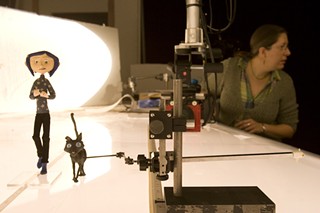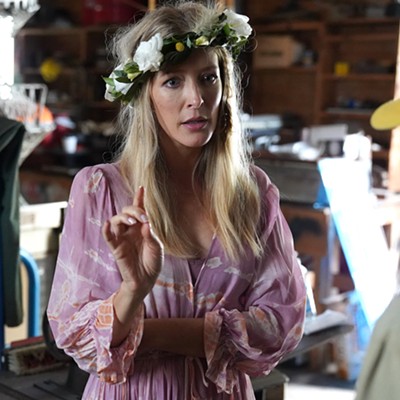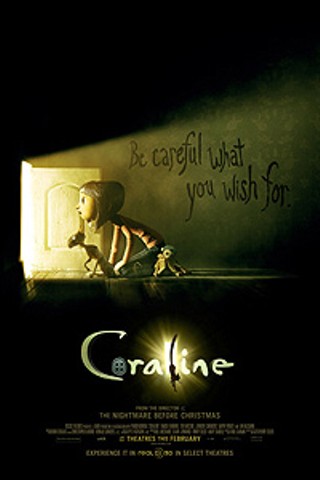Those that are familiar with Neil Gaiman's fanciful, fairytale, dreamy, literary oeuvre are equally familiar with the various cinematic incarnations of his work. But the most significant is the upcoming Coraline, directed by The Nightmare Before Christmas' Henry Selick, followed by 2007's Stardust by Matthew Vaughn (director of Layer Cake and a producer of Guy Ritchie's early films) and MirrorMask by longtime Gaiman collaborator, Dave McKean.
The three films are differently executed, and yet remain true to their Gaiman-inspired fantasy roots. Each film creates a fantasy dream world in a unique way: Coraline is a mix of stop-motion animation and 3D photography; Stardust is a live-action fairy tale that gets the fantasy elements across in its art direction, while featuring left-field performances from huge stars like Robert DeNiro and Michelle Pfeiffer; MirrorMask relies heavily on visual artistry to aid its story.
In his writing, Gaiman can be easily slotted into the science fiction-fantasy genre, though he certainly covers a lot of ground within that category. His novels like American Gods and Neverwhere are lightly plotted yet vividly written, and could be described primarily as adventure stories with elements of mystery and a deluge of mythological allusions, whereas Gaiman's landmark comic series, The Sandman, is a dark fantasy.
The film adaptations of Gaiman's work have trended towards his more fanciful literary efforts. MirrorMask (2005) is a collaboration between the book's original illustrator, Dave McKean, and Jim Henson Studios. The film is a visual treat, but somewhat lacking in terms of plot and pacing. The story of Helena, who retreats into a dream world when her mother falls ill, relies on too many visual set pieces in lieu of story to tell its tale. A newbie to the world of MirrorMask would be hard pressed to describe what they just watched.
Roger Ebert described the experience as "Helena [wandering] endlessly past one damn thing after another, and since everything that happens in this world is absolutely arbitrary, there's no way to judge whether any action is helpful or not."
More successful is Vaughn's Stardust, a deft live-action romp that works as much as a play on fairy tales as it does a sincere love story between a peasant boy and a fallen star. Its jokes are as subtle (Sienna Miller as a shallow princess) as they are obvious (Michelle Pfeiffer as an evil, old hag), while the fairy tale elements---a flying sailboat, falling stars and wicked witches---are beautifully executed. The fantasy elements work so well because the recognizable stars ground people in Stardust's setting. When a mouthy and irritable pawnshop owner is played by Ricky Gervais, as an audience, you know exactly what you're up against.
Coraline is the most recent Gaiman adaptation, and in sticking to the trend, is completely different in execution from his other films. Voiced by actors such as Dakota Fanning, Teri Hatcher and John Hodgman, and filmed in stop-motion animation and 3D, Coraline utilizes a stylized aesthetic to convey its "be careful what you wish for" message. Coraline Jones discovers a door in her living room that acts as a portal to an alternate world, one that is more inviting than her mundane existence, but one that subsequently refuses to give her back to her harried, distracted yet loving parents. The supporting voice-cast is the real treat of the film, with famed comedy duo Jennifer Saunders and Dawn French voicing faded actresses and Ian McShane as a kooky neighbour. There are elements of adventure and light horror to Coraline, but nothing that could leave lasting scars on the minds of impressionable youngsters.
Gaiman's legions of fans means there is a healthy appetite for adaptations of his works and, given his considerable talent with the pen, there is a call for him to write Hollywood pictures as well. (He co-wrote the screenplay for 2007's Beowulf with Roger Avery.) The Internet Movie Database credits six "in development" projects to his name and Gaiman himself announced on the Today Show during the Coraline press tour that veteran British director Neil Jordan will adapt 2008's The Graveyard Book. Given the range of subjects in Gaiman's stories, expect many more films to come, in a variety of different looks and styles.
Coraline opens Friday, February 6.
See Movie Times for screening info.
















